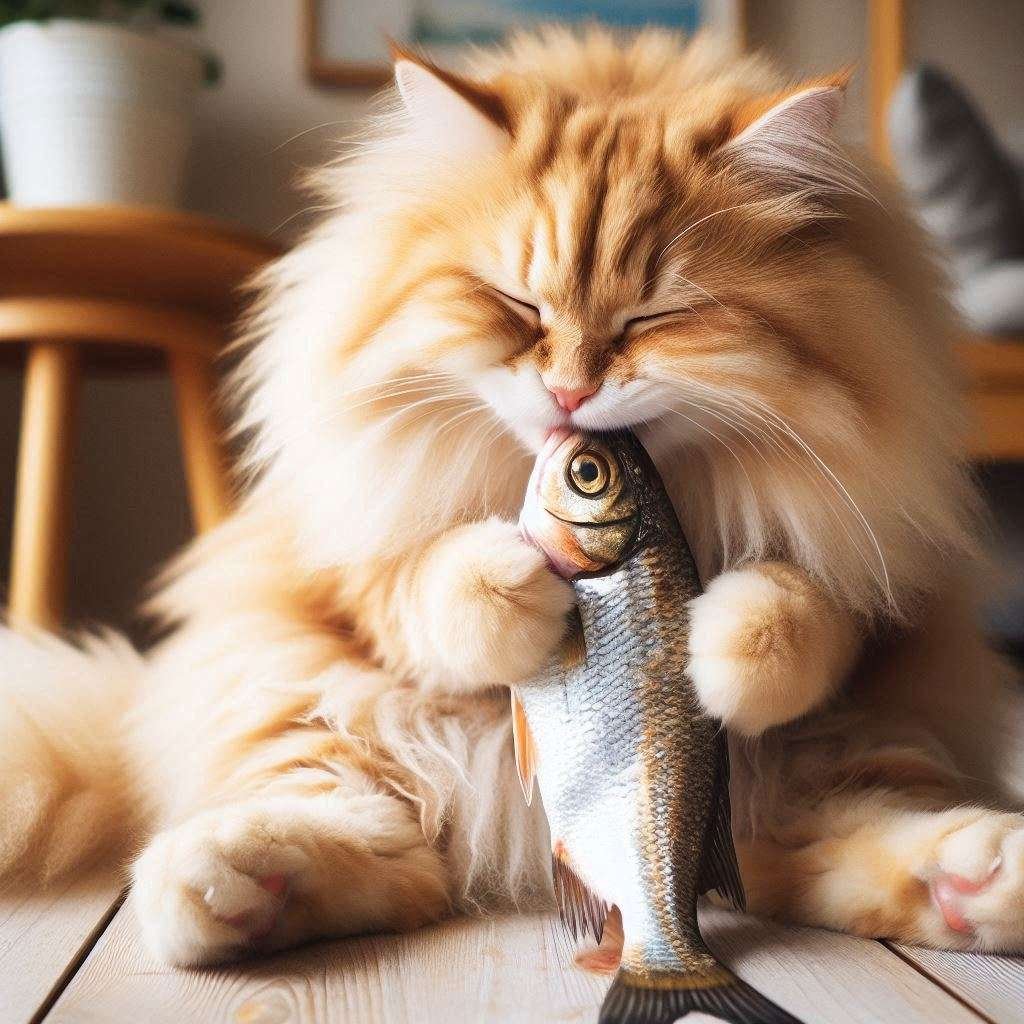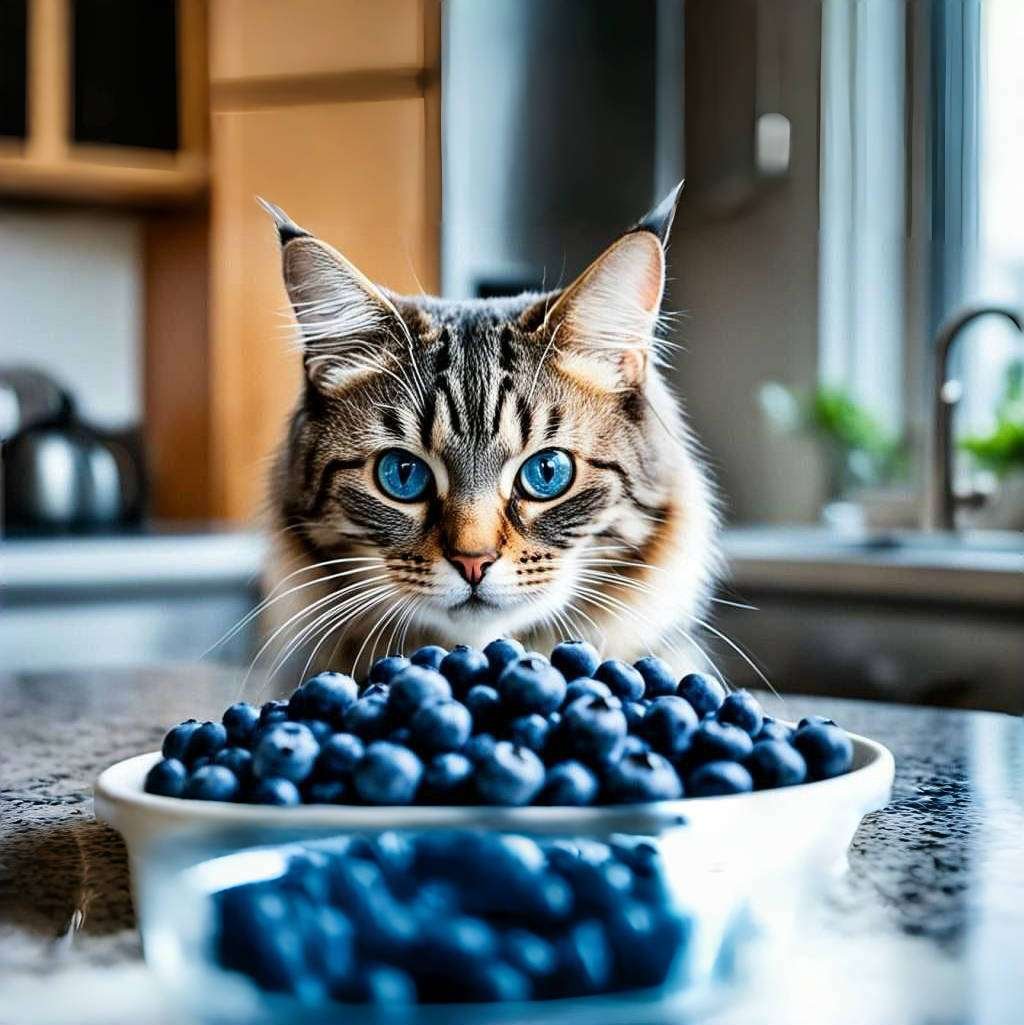Cats often seem to be drawn to cheese, looking at it with great interest. But can cats eat cheese? Many owners think cats love dairy, so they wonder if cheese is good for their pets. The answer is, cheese should be given to cats with care. Most cats can’t handle lactose well and may get sick from dairy.
Cheese isn’t toxic to cats, but it’s high in fat and salt. These can cause health issues if eaten too much. Owners should think about their cat’s lactose tolerance and diet before giving cheese as a treat.
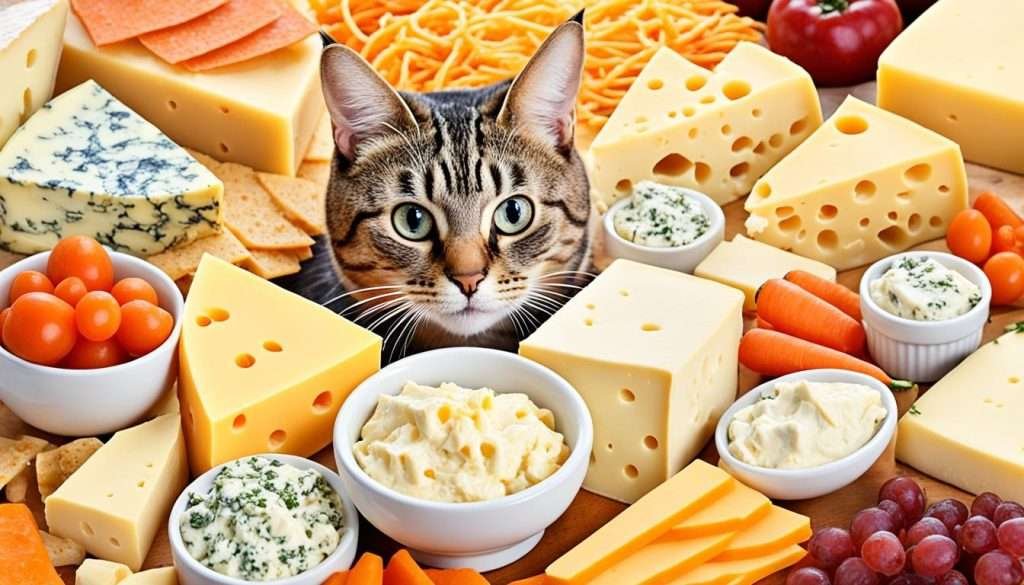
Key Takeaways
- Cats are generally lactose intolerant, making dairy products like cheese difficult to digest.
- Cheese is high in fat and salt, which can be harmful to cats if consumed in excess.
- Kittens may have a better ability to digest dairy, but this diminishes as they grow older.
- Cheese should only be offered to cats as an occasional treat and in small portions.
- Some cat-friendly cheese options include cheddar, Swiss, and Parmesan, while others like cottage and mozzarella are best avoided.
What Happens When Cats Eat Cheese?
Cheese might taste great to us, but it’s not good for cats. Cats can’t digest cheese well because they don’t have the right enzyme. This is because most cats are lactose intolerant.
When cats eat cheese, they might get sick. They could throw up, have diarrhea, or feel pain in their belly. Even if a cat isn’t lactose intolerant, cheese isn’t good for them. It’s too fatty and salty.
Is Cheese Bad for Cats?
Feeding cats cheese too often can make them gain weight and have skin problems. A little bit of cheese as a treat is okay, but watch how your cat reacts. Be careful not to give them too much.
Potential Side Effects of Feeding Cheese to Cats
- Digestive issues like vomiting, diarrhea, and constipation
- Abdominal pain and discomfort
- Weight gain due to the high fat and calorie content
- Skin problems such as rashes or irritation
- Potential toxicity from certain cheese varieties (e.g., moldy blue cheese)
Not every cat will get sick from cheese. But, dairy products can be risky for them. It’s best to give them safe treats instead of cheese.
If you want to give your cat a little cheese, pick low-fat and low-sodium kinds. Watch how they react. Talking to your vet can help you choose the right cheese and how much to give.
Can Cats Eat Cheese? Feline Dairy Consumption
Cats can have a little bit of cheese as a special treat sometimes. But, it shouldn’t be a big part of their diet. Cheese is full of fat and protein, which cats like. But, it’s not a food they naturally eat.
Most cats can’t digest dairy well because they are lactose intolerant. This means they don’t have the right enzymes to break down dairy products. So, cheese should only be a small part of their diet.
For treats, cheese should not be more than 5% of a cat’s daily calories. This is because cheese is high in fat and sodium. Hard cheeses like cheddar, Swiss, and parmesan are safer for cats than soft cheeses like cottage cheese or mozzarella.
It’s also best to avoid giving cats cheese-flavored snacks. These snacks can have ingredients that are bad for cats.
| Cheese Type | Lactose Content | Suitability for Cats |
|---|---|---|
| Hard, Aged Cheese (Cheddar, Swiss, Parmesan) | Lower | Safer for occasional treats |
| Soft Cheese (Cottage, Cream, Mozzarella) | Higher | Avoid or limit consumption |
| Cheese-Flavored Human Snacks | N/A | Potentially Harmful |
When giving can cats have cheese to cats, do it in small amounts and watch how they react. Some cats might get upset stomachs from cheese. Kittens should not have cheese because they might get lactose intolerant as they grow.
Cats with health issues like obesity or heart disease should also avoid cheese. It has a lot of fat and sodium.
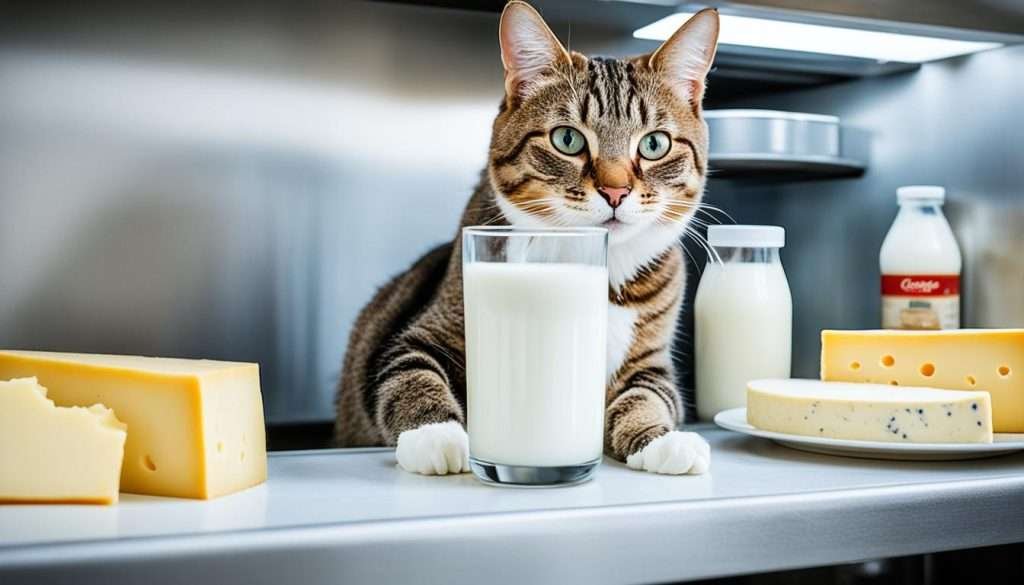
While feline diet and dairy can include cheese sometimes, it shouldn’t be a regular thing. Cats should mainly eat meat-based foods. And, when giving them cheese, make sure it’s just a little bit and only sometimes.
Why Do Cats Like Cheese?
Cats love the rich, fatty taste of cheese because their taste buds are made for it. They need a diet full of animal proteins and fats to stay healthy. Cheese tastes and feels good to them, even though it’s not the best food for their health.
This love for cheese often makes owners give it to their cats as a treat. But, this can be bad for their health.
Understanding Cats’ Attraction to Cheese
Cats don’t like sweet tastes much. They prefer fatty, meaty flavors because they are meat-eaters. Cheese’s high-fat and savory taste fits what they like. Plus, many cats can’t digest the sugar in dairy products like cheese and milk. But, the smell and feel of cheese are hard for them to resist.
- Cats’ taste buds are programmed to detect high-fat and protein-rich foods, making cheese an appealing option.
- As obligate carnivores, cats require a diet high in animal-based proteins and fats to thrive.
- The rich, fatty flavors and creamy texture of cheese trigger a cat’s appetite, even though it may not be the healthiest choice.
- Many cats are lactose intolerant, but the allure of cheese’s aroma and texture often outweighs potential digestive issues.
Even though cats can’t get enough of cheese, it’s crucial to know the risks. It’s important to give them healthy treats instead. Always watch how much dairy you give to your cats.
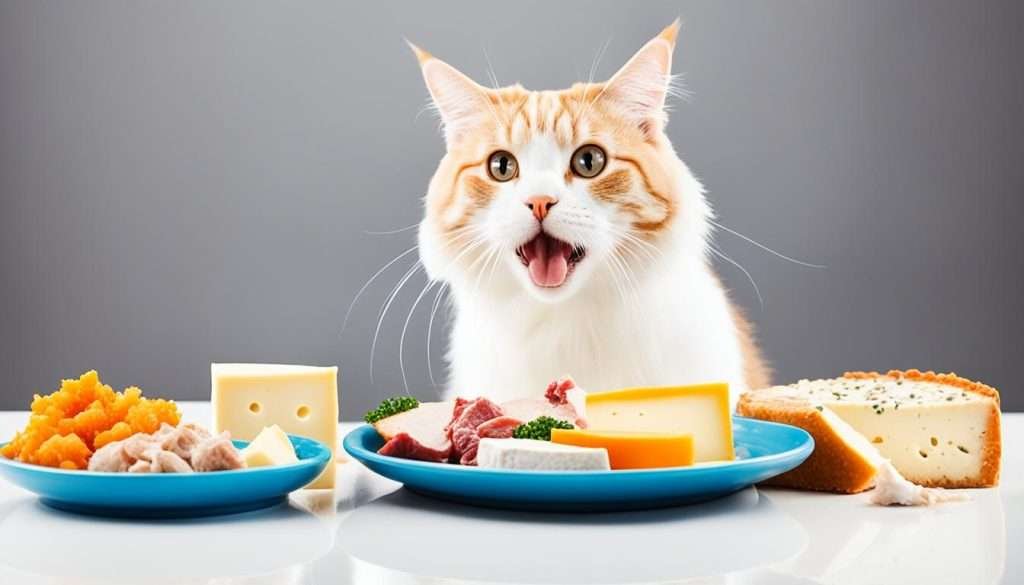
Safer Cheese Alternatives for Cats
Cheese can be a treat for cats sometimes, but it shouldn’t be a regular part of their diet. Cats don’t have the right enzymes to digest dairy, which can cause stomach problems like diarrhea and vomiting. Luckily, there are safer options that can satisfy a cat’s taste without the risks of cheese.
Cooked, unseasoned chicken or fish are great choices. They are rich in protein and taste good to cats. Freeze-dried meat treats are also a good option, offering a crunchy snack that’s easy for cats to digest.
If your cat likes the creamy texture of cheese, try giving them a bit of plain, low-fat yogurt or kefir. These have less lactose, making them easier on a cat’s stomach. Some cats can also have hard, aged cheeses like cheddar or parmesan in small amounts because they have less lactose than soft cheeses.
Always talk to a vet before adding new foods to your cat’s diet. They can suggest the safest and best options for your cat’s needs and likes. With some creativity and attention, you can find healthy cat treats and cat-safe foods that your cat will enjoy as much as alternatives to cheese.
| Safer Cheese Alternatives for Cats | Advantages |
|---|---|
| Cooked, unseasoned chicken or fish | Provides protein and flavor without lactose |
| Freeze-dried meat treats | Crunchy, savory snack that’s easy to digest |
| Plain, low-fat yogurt or kefir | Contains less lactose than cheese |
| Hard, aged cheeses (e.g., cheddar, parmesan) | Lower in lactose compared to soft cheeses |
Always consult with a vet for the best cat-safe foods and healthy cat treats for your cat. With a bit of creativity and care, you can find alternatives to cheese that your cat will love just as much.
Conclusion
Cats love cheese, but it’s not a good idea to give it to them often. Most cats can’t digest cheese well and may get sick from it. Even if a cat can handle a little cheese, it’s too fatty and salty. This can make them gain weight and have other health problems.
It’s best to give cheese as a rare treat and choose healthier options for your cat. Always talk to a vet before adding new foods to your cat’s diet. This helps make sure cheese doesn’t upset their stomach.
Even though it’s tempting to give cheese to your cat, think about their health first. Keep their diet balanced and cat-friendly. This is the best way to keep them healthy and happy.
FAQ
Can cats eat cheese?
Is cheese safe for cats?
Are cats lactose intolerant?
Can kittens eat cheese?
What types of cheese are safe for cats?
Can cats have cheese-flavored snacks?
What are safer treat options for cats instead of cheese?
Source Links
- Can Cats Eat Cheese? Read Before You Feed | Purina
- Can Cats Eat Cheese?
- Can cats eat cheese? | Meow Blog
- Can Cats Eat Cheese?
- Can Cats Eat Cheese? It’s Complicated
- Can Cats Eat Cheese?
- Can Cats Eat Cheese? Everything You Need to Know
- Foods Your Cat Should Never Eat
- Can Cats Eat Cheese? Here’s What Vets Say
- Can Cats Eat Cheese?
- Can Cats Eat Cheese? | Litter-Robot
- Can Cats Eat Cheese? – – CattyLicious.com
- Is Cheese Bad for Cats?
- Can Cats Eat Cheese? Yes, But Do They Need It?
- Can Cats Eat Cheese? What To Know & If They Should
